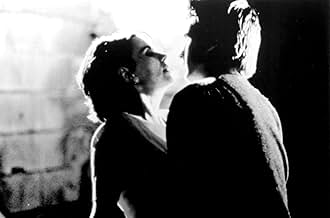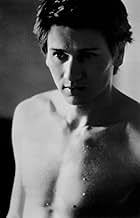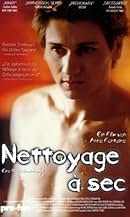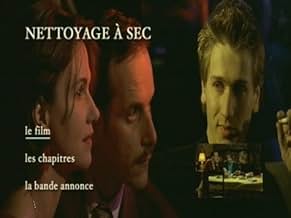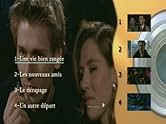IMDb RATING
6.7/10
1.2K
YOUR RATING
A bored couple takes in a young man who turns their lives inside out.A bored couple takes in a young man who turns their lives inside out.A bored couple takes in a young man who turns their lives inside out.
- Director
- Writers
- Stars
- Awards
- 3 wins & 6 nominations total
- Director
- Writers
- All cast & crew
- Production, box office & more at IMDbPro
Featured reviews
In a small town in France, Nicole Kunstler (Miou-Miou) and her husband Jean-Marie Kunstler is a traditional French middle-class couple, bored with their years of marriage and running a small business of cleaning and ironing clothes with some financial difficulties. When they meet the bisexual Loic (Stanislas Merhar) working as drag in a night-club with his sister Marylin (Mathilde Seigner), the sexually dissatisfied Nicole feels a great sexual attraction for him. The couple brings the young man to live and work with them, in a weird relationship, and Nicole has an affair with Loic and becomes a happy person. This intriguing triangle of love has a tragic end. "Nettoyage à Sec" is almost an excellent romance. The screenplay begins very daring, but the solution for the love situation is very moralist and resolved in a tragic, but easy way. The cast has a great performance and the direction is very good, but the story deserved a better conclusion. My vote is seven.
Title (Brazil): "Lavagem a Seco" ("Dry Cleaning")
Title (Brazil): "Lavagem a Seco" ("Dry Cleaning")
To me, a romantically inclined gay man, this was a fascinating but ultimately unfulfilling tale of a `normal' French couple, Nicole and Jean-Marie Kunstler, who have grown unsatisfied with their settled, routine lives. The couple runs a dry cleaning business in an unexciting small French town. Their lives change when they go to a bar with some business associates and encounter Loïc and Marylin, a cross dressing brother/sister act. From the first, the couple is fascinated with the pair but particularly with Loïc, the sexually ambiguous brother, (played to perfection by Stanislas Merhar).
The couple is so enchanted with the pair that they take a weekend to the city where the performers are appearing next. When the sister decides to end the act and run away with her lover, the brother insinuates himself into the couples lives. The young man claims to be, and is by all indications, straight and soon takes the wife as a lover. The husband is also aroused by the boy but denies his attraction. Soon the boy is living in the couple's home and working in the Dry Cleaning shop and is showing a talent for that type of work. He even befriends the couple's child and helps him with homework and takes him skating.
Whether his good work arises from Loïc's desire to repay Jean-Marie or from some innate talent for dry cleaning is unclear. I think that Loïc feels guilty about cuckolding this man who has shown him nothing but kindness, genuinely likes the guy, and is aware of the man's attraction to him. He wants to make amends in any way that he can. Ultimately Loïc offers himself to Jean-Marie physically but is rebuffed.
Whether it's the husband's `homosexual panic' or his actually seeing his wife with Loïc during one of their trysts, Jean-Marie decides that Loïc must go. This leads to the final and I think dissatisfying concluding scenes.
The couple is so enchanted with the pair that they take a weekend to the city where the performers are appearing next. When the sister decides to end the act and run away with her lover, the brother insinuates himself into the couples lives. The young man claims to be, and is by all indications, straight and soon takes the wife as a lover. The husband is also aroused by the boy but denies his attraction. Soon the boy is living in the couple's home and working in the Dry Cleaning shop and is showing a talent for that type of work. He even befriends the couple's child and helps him with homework and takes him skating.
Whether his good work arises from Loïc's desire to repay Jean-Marie or from some innate talent for dry cleaning is unclear. I think that Loïc feels guilty about cuckolding this man who has shown him nothing but kindness, genuinely likes the guy, and is aware of the man's attraction to him. He wants to make amends in any way that he can. Ultimately Loïc offers himself to Jean-Marie physically but is rebuffed.
Whether it's the husband's `homosexual panic' or his actually seeing his wife with Loïc during one of their trysts, Jean-Marie decides that Loïc must go. This leads to the final and I think dissatisfying concluding scenes.
The mellow, mesmerising tune of the theme music by Edouard Dubois made me watch this movie twice while on a transcontinental flight. The music was only one reason among others that made me watch the film twice in four hours. I am a French film enthusiast and the contents of the film (latent homosexuality, guilt, cross dressing, etc.)were not out of the ordinary. What was striking in the film was the deliberate, structured screenplay that made me recall early works of Marcel Carne. I was not surprised to learn that the screenplay won an award at the prestigious Venice Film Festival and nominated for a Cesar in France.
The film's beginning and end revolve around affirmation of marital bonds, while the bulk of the film (to me only the sub-plot) ventures into transgression of those bonds followed by redemption. There is sadness at the end but it also accompanied by a silent studied reaffirmation of faith between man and wife. The final walk of the duo is an ordinary event yet captured powerfully in this film. I recommend this film to those who have not seen it not as a film that is extraordinary, but one which encourages viewers to introspect and look at ordinary lives, not of superheroes but of less than perfect men and women. The film succeeds because of low-keyed acting (Merhar and Miou-Miou), the sombre yet mesmerising music and good mise-en-scene. The film discusses "drycleaning" of two individuals' marital life, but the script and the director elevate the wife as strong personality with a level-headed strength developed quite unobtrusively as the film progresses. Anne Fontaine, the director, is someone to watch out for in the future as is Edouard Dubois. In more ways than one (direction, cinematography, the script) the film gives a woman's perspective of the story, though a wee bit sombre.
The film's beginning and end revolve around affirmation of marital bonds, while the bulk of the film (to me only the sub-plot) ventures into transgression of those bonds followed by redemption. There is sadness at the end but it also accompanied by a silent studied reaffirmation of faith between man and wife. The final walk of the duo is an ordinary event yet captured powerfully in this film. I recommend this film to those who have not seen it not as a film that is extraordinary, but one which encourages viewers to introspect and look at ordinary lives, not of superheroes but of less than perfect men and women. The film succeeds because of low-keyed acting (Merhar and Miou-Miou), the sombre yet mesmerising music and good mise-en-scene. The film discusses "drycleaning" of two individuals' marital life, but the script and the director elevate the wife as strong personality with a level-headed strength developed quite unobtrusively as the film progresses. Anne Fontaine, the director, is someone to watch out for in the future as is Edouard Dubois. In more ways than one (direction, cinematography, the script) the film gives a woman's perspective of the story, though a wee bit sombre.
Sad, melancholic, nostalgic and soft.
A film about illusions and impossibility of escape. Description of failure and ambiguous expectation. French flavor and marks from Pasolini, empty universes and slices of love, game without innocence and failure of dreams.
A world, a small world where the work is only real refuge. Where the memories or the projects are shadows of a lost time and a bovaric certitude.
Delicate and tender, subtle and innocent, this film is a pledge for discover the sense of existence. The image of war with the other or with yourself, the fear like basic answer to the movement of time, the questions like skin of interior fog, the presence of temptation in the person of an androgynous teenager, the looks, deceptions or infidelity are elements of ordinary life. For everyone, "The Queens of Night" are key to a second chance, to a form of happiness. But always, the happiness is puzzle of illusions and the old rules are more strong that any form of seduction. In final, the corpse of a gorgeous dream like only "souvenir" of a perverse form of normality.
A film about illusions and impossibility of escape. Description of failure and ambiguous expectation. French flavor and marks from Pasolini, empty universes and slices of love, game without innocence and failure of dreams.
A world, a small world where the work is only real refuge. Where the memories or the projects are shadows of a lost time and a bovaric certitude.
Delicate and tender, subtle and innocent, this film is a pledge for discover the sense of existence. The image of war with the other or with yourself, the fear like basic answer to the movement of time, the questions like skin of interior fog, the presence of temptation in the person of an androgynous teenager, the looks, deceptions or infidelity are elements of ordinary life. For everyone, "The Queens of Night" are key to a second chance, to a form of happiness. But always, the happiness is puzzle of illusions and the old rules are more strong that any form of seduction. In final, the corpse of a gorgeous dream like only "souvenir" of a perverse form of normality.
Saw a humongously uninspired French movie, Dry Cleaning (Nettoyage a Sec), that the advertisers swear won Cesar awards all over the place, but is just a hodgepodge of every foreign movie cliche that might strike an upscale audience as profound: a sexually ambiguous stranger insinuates himself into the lives of a married couple, engaging them in sexual games that bring them to the brink of self-destruction. She's desolate without the young man; the husband wrestles with his denial that he's also turned on by the stranger. Of course this is "art theatre," so we are to suppose that every straight man is really a gay man who hasn't found out yet. On the other hand the homosexual aspect of the story becomes the vehicle that carries the husband into his own corner of hell, an idea that seemed arty thirty-odd years ago (The Sergeant; The Children's Hour) but now is just insulting to gays. And of course the story is dotted with major and minor sexual interludes and taunts, but relationships are left to angry, dissatisfying silences between not-particularly-interesting characters. Story elements are offered that suggest the plot could go somewhere else but instead lead nowhere (the young man's sister leaves and conceivably might return looking for him; the young man has genuine talent as a dry-cleaner and might make a life for himself beyond his "drifter" existence; the married couple thinks about moving to Canada). I think the filmmaker has a long way to go in justifying why he wanted to make this movie -- what he thought would make this film extraordinary compared to some other story about dissolving marriage or sexual curiosity. Imagine La Strada if Anthony Quinn just sat around and brooded. If Thomas Mann had written Dry Cleaning it would be called Death in Suburbia: except that, speaking strictly for myself, I think it's the audience that dies.
Did you know
- SoundtracksTexas Rocker
Written by Alan Darby
- How long is Dry Cleaning?Powered by Alexa
Details
Box office
- Gross US & Canada
- $14,919
- Opening weekend US & Canada
- $14,919
- Feb 7, 1999
- Gross worldwide
- $14,919
- Runtime
- 1h 33m(93 min)
- Color
- Aspect ratio
- 1.66 : 1
Contribute to this page
Suggest an edit or add missing content

